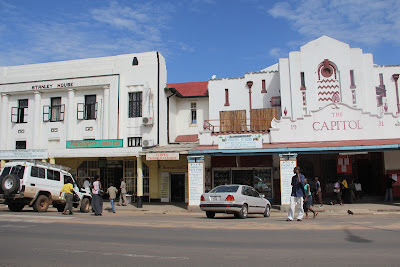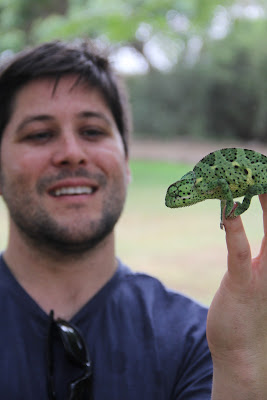Slummin' it.
A tasty snack.
There's plenty of room. What could possibly go wrong?
Little did they know.
It was like that.
LIKOMA ISLAND, Malawi – Dawn broke soggy and still as the sky turn from murky black to pale gray. A dead rat floated out from the ship. It was the most miserable sunrise of our lives.
I sat against the wall where I had slumped for the night, watching the water drip off the side railing, mustering the energy to change into dry clothes, hoping for sunshine. Connie scratched a neat line of mysterious bug bites that had cropped up after a couple fitful hours on a rank, rented mattress. My fellow travelers blinked into the realization that Monday had merged into Tuesday and slowly stirred. The comatose Burundian continued to snooze.
Anchored off the shore of Likoma Island, in view of the rugged green mountains of the Mozambique coast, hundreds of passengers along with tons of goods, were ferried to the shore skiff by skiff the only speed the Ilala knew: slowly.
Storm damage was light, considering the suddenness and ferocity of the previous night’s squall: clothes and sleeping bags soaked, but the guts of our backpacks, electronics and all, mostly unscathed under our protective rain guards. The underdeck of the ship resembled a Third World laundry, with drenched clothes hanging from every inch of wire and hook-shaped metal available.
A fish eagle screamed as it flew towards the boat, dove for the water, and plucked the dead rat from the water.
Built in Scotland in 1951 as a steam ship, the MV Ilala replaced it’s less fortunate predecessor of the same name after the first Ilala sank in a storm in 1946.The engine was later converted to diesel, though many of the important bits are still original, requiring creative engineering from the crew when something breaks. Depending on who you ask the name either refers to a village in Tanzania (the Tanzanians claim a northern portion of the lake, a matter of some friction between them and their Malawian neighbors), the word for ‘bird’ in Tanzania’s main language of Swahili, or, roughly, ‘something big’ in the Malawian language of ChiTumbuka. Malawians seem to prefer the latter explanation.
A plaque on the ship’s bow show’s it was rechristened by Malawi’s first post-independence dictator, “His Excellency The Life President Ngwazi Dr. H. Kamzu Banda.”
The Ilala’s top speed is leisurely*, though it usually travels at half that, taking a week to circle the lake, acting as a vital connection for villagers in three countries to get their goods to market.
The ship’s captain was Daniel Ngwira, a 30-year-old who bore a striking resemblance to Tupac Shakur and somewhat resented the comparison. Ngwira had worked his way up from swabbing the decks to piloting the ship in just five years, following his studies to the treacherous seas off Ethiopia and as far as Brazil. He seldom smiled.
His dour demeanor broke only when I found his weak spot: I asked for a tour of the ship. He had been working for six weeks without a break and seemed happy to break the monotony.
“Other people are scared. They think that one day (the ship) will just break,” he said, as he showed me around the captain’s deck.
The thought had occurred to me as the ship pitched and rolled the previous night and I was not comforted by the fact that his navigational maps dated from the 1950s.
Ngwira spoke matter-of-factly about the Ilala, without the overwrought reverence many ship buffs have for such historic vessels. “An old thing” he called her more than once.
I asked if he ever became scared during some of the brutal storms that popped up on Lake Malawi from time to time.
“I can’t think about that, I can only think about keeping the boat going, because I don’t want to be the 30-year-old captain who took down the 60-year-old Ilala,” he said.
“Amen, brother,” I thought.
The tour lifted my spirits and the sun broke through in the afternoon, though we were still moored off Likoma Island some six hours after we arrived. With the sun, the brandy started flowing again, Connie and I played cards with a friendly Swiss couple on the top deck and we achieved something resembling enjoyment for the first time since the storm.
Eventually, we even left Likoma Island after just eight short hours and, as we approached Mozambique, the crew raised that country’s peculiar book and AK-47 flag and anchored off a coast of verdant mountains and tiny villages of thatch-roof huts. The German and Burundian couple we had befriended ambled into the skiff that was ferrying passengers to the border post, smiling and waving as they took off for what they expected to be their next adventure.
A short time later we saw the skiff returning, empty except for the crew and our friends. As the couple walked sullenly back to the top deck we noticed their packs were sodden and they were soaked from the chest down. After wading through the water to get to the beach – the skiff couldn’t get any closer to the shore – they were told by the border agents that they could not get a visa at that post. Always a surprise on the Ilala.
We invited our unfortunate traveling companions over for a cheer-up drink and began to discuss the climatic possibilities of the evening and the best places to find a dry night of sleep. As we looked nervously to the sky and plotted our sleeping spot for the night, we got the weather report from the crew.
Westerners like to assign mythical powers to Africans, assuming they can divine the actions of wildlife, the medicinal qualities of plants, and, most popularly, the weather. Most often, this is bullshit.
“I think it will be calm,” said the captain.
“The sky is clear, it will not rain,” the surly canteen manager said, pointing at a cloudy, sunless sky while trying to evict us from our precious dry sleeping spot in front of the private cabins of better paying customers.
“Fuck all of you and your little boat, too,” replied the sky, opening up with another storm after we stupidly set up our sleeping bags on the top deck again. But we were prepared this time and, as most of the passenger’s had cleared out at Likoma Island, the benches in steerage class in the dry underbelly of the ship were clear and we managed our first meaningful sleep of the voyage.
The next day broke clear and calm and we enjoyed our final hours on the ship before docking on the stunning, rocky, bird- and baboon-rich coastline of Monkey Bay. We were all smiles as we gathered our things and disembarked. Wearing my sandals, I forgot my shoes on the boat. They were promptly stolen.
*Top speed is 15 knots, but 8 knots is the norm.
















